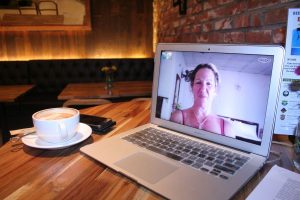Oral history is Studs Terkel interviewing ordinary Chicagoans—from hot dog vendors to socialites—for his book Division Street. Oral history is Hurricane Katrina survivors sharing their memories of the 2005 disaster. And oral history is you interviewing folks about the coronavirus pandemic—via phone or video, of course—while sheltering in place.
Want to learn more? Get started with these resources, whether you want to conduct an oral history or simply treat yourself to firsthand accounts of lives and events.
A formal definition of oral history, courtesy of the Oral History Association, is "gathering, preserving and interpreting the voices and memories of people, communities and participants in past events." The association's website is a great resource if you want to go all in on oral history. Highlights are a webinar on conducting remote interviews and the Resources page, which includes Web Guides to Doing Oral History and Oral History Centers and Collections.
For a quick-start guide to oral history, check out Tutorials: Beginning an Oral History Project from the Samuel Proctor Oral History Program. 8 Steps to Doing Oral History is an excellent one-page outline of the basics, and Oral History Workshop is an accessible and encouraging how-to on interviewing.
Want to hear a great oral historian at work? Studs Terkel's empathy and gentle interviewing style coaxed great stories from his subjects. Studs Terkel: Conversations with America has clips from the original interviews for his oral history books, including Hard Times, about the Great Depression. In one of my favorite clips, a joyous man recalls the arrival of the first WPA checks. ("Everybody loved each other. They were toasting each other! You know, they had money in their pocket for the first time.")
The Library of Congress has a wealth of material, much of it online. Here's a sampling of its digital oral history content, including the Civil Rights History Project featuring interviews with 175 participants in the movement.
If you're in need of inspiration, check out the HistoryMakers, an archive of video interviews with significant African Americans. Although it includes famous people, it’s the less famous but fascinating that are its strength: people like artist and printmaker Margaret Burroughs, who co-founded the DuSable Museum of African American History, and orthopedic surgeon Dr. James Hill, who memorably reminisces about his Westside childhood as well as his career.
There are so many great oral history sites. Do you have any favorites? Who would you like to interview?



Add a comment to: Explore Our Stories Through Oral History: 5 Online Resources